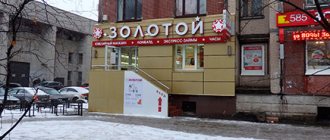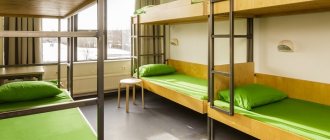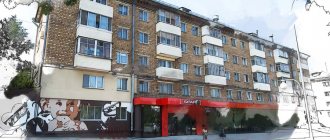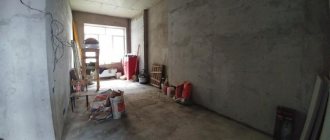I. General provisions
1. In accordance with the Regulations “On state accounting of the housing stock in the Russian Federation”, approved by Decree of the Government of the Russian Federation of October 13, 1997 N 1301, technical accounting of the housing stock is assigned to specialized state and municipal organizations of technical inventory - unitary enterprises, services, departments , centers, bureaus (hereinafter referred to as BTI), the methodological support of which is provided by a state specialized organization.
The federal state statistical observation form “Information on the housing stock” is filled out by organizations (bureaus) of technical inventory (BTI) for the entire housing stock, regardless of its ownership and forms of ownership, and is submitted to the state statistics body at the place established by the territorial body of the State Statistics Committee of Russia in the republic, region, region, a city of federal significance.
Housing stock - the totality of all residential premises, regardless of form of ownership, including residential buildings, specialized houses (dormitories, hotels - shelters, houses of flexible stock, residential premises from the housing stock for the temporary settlement of forced migrants and persons recognized as refugees, special houses for single people for the elderly, boarding houses for the disabled, veterans and others), apartments, office premises and other residential premises in other buildings suitable for habitation.
A residential building (house) is considered to be a structure that has a postal number (address approved by an administrative document of a local government body), all or at least half of the area of which is intended for permanent residence, located on a land plot within certain boundaries with all auxiliary structures and elements located on it improvement, a building suitable for permanent residence, in which residential premises make up more than half of the area of the building.
Hotel residential or non-residential premises
Non-residential real estate - apartments and separate rooms not intended for living. They are most often used to create offices or run their own business.
Such apartments can take place in both residential and non-residential buildings. In this article, we will look at how residential premises differ from non-residential ones, and also discuss whether various objects belong to residential or non-residential buildings. Dear readers! Our articles talk about typical ways to solve legal issues, but each case is unique. If you want to find out how to solve your particular problem, please use the online consultant form on the right or call. It's fast and free! Often real estate is divided into residential and non-residential.
- As for non-residential property, it is often used for commercial or public purposes. The need to transfer housing from one fund to another may arise both from entrepreneurs and from other people who want to use the space to create an office.
- Residential premises include premises in which people legally live. These are dormitories, apartment and private houses, a summer house, a garden house. Also, almost all types of hotels are considered to be residential.
If you have such a need, do not sound the alarm once again. The living space has the following signs:
- It is isolated from others.
- Recognized as real estate.
- Fits
- Recognized as suitable for habitation.
Category "Economy"
Category 2 - Hotel room, consisting of one daily room with one / two beds, with a partially equipped bathroom (sink, toilet or one full bathroom in a block of two / three rooms), located for one / two people (minimum area, see below). Annex 1).
3 categories - a hotel room consisting of one residential room with a number of beds depending on the number of people, with a partially equipped toilet (washbasin, seven or one full toilet in a block of two or three rooms), designed to accommodate several people, with a falling area per person: 6 m2 in buildings with year-round function, 4.5 m2 in buildings with seasonal function
Category 4 - hotel room, consisting of one living room with a bed in the number corresponding to the number of people using the housing, with a washbasin, designed to accommodate several people, with an area for one person using the housing: 6 m2 in buildings with all functions, 4, 5 m2 in buildings with seasonal functions.
In case of shelter, the area of the room is at least 4 m2 up to one bed (single or bunk bed, the distance from the top edge of the bunk bed from the ceiling is at least 75 cm).
Category 5 - a hotel room consisting of one living room with a number of beds depending on the number of people, without bathrooms (toilets and bathrooms, shared showers), designed for several people, with an area per resident: 6 m2 in buildings with year-round access operation, 4.5 m2 in buildings with seasonal work.
In the dormitory, a minimum of 4 m2 is allowed per bed (single or bunk, the distance from the top edge of the bunk bed to the ceiling is at least 75 cm).
A hotel is a residential or non-residential premises
Free consultation by phone Contents
In St. Petersburg, there is such a practice: to open hotels in residential buildings, for example, on the first floors.
This is how many economy class mini-hotels appeared in our city. If you look into the issue of organizing a hotel in a residential building, many nuances and difficulties arise. They must be taken into account in order to convert a residential building into a hotel.
And, in some cases it is not required. There is order No. 197
“On approval of the regulations on the state classification system of hotels and other accommodation facilities”
. It states that accommodation facilities include hotels, hostels, and models, and a room is one or more residential premises with the necessary equipment and furniture. The Housing Code of the Russian Federation and, in particular, Article 19 defines hotels as housing stock for commercial use. Therefore, deciding what a hotel is (residential or non-residential premises) is irrelevant.
Thus, the following documents speak against accommodation: Decree of the Government of the Russian Federation No. 490 (dated April 25, 1997) “On the establishment of rules for the provision of hotel services” says
How to choose a location and prepare documents for opening?
The best place for a hostel is the city center. For example, in the historical center of St. Petersburg, mini-hotels are in great demand because all important architectural and museum sites are within walking distance.
It is also important that there are bus stops or a train station near the hostel. For tourists traveling by car, parking and convenient access to the building are important. The interior decoration of the hostel must comply with the basic rules in the hotel business: cleanliness, silence, comfort.
To register real estate for a hostel, you will need the following package of documents:
- Permission from the fire service to ensure that the premises comply with fire safety standards.
It is possible that the hostelier will be asked to saturate the floor and roof with a fire-fighting compound and check fire entrances and exits. - Certificate from Rospotrebnadzor. The premises must fully meet the requirements of the sanitary and epidemiological service.
- Certificate from the tax office of registration.
- Garbage removal agreement.
- A document that confirms that the size of the room complies with GOST for one person.
- A lease agreement for premises or a certificate of ownership of the premises.
The hotel is a residential or public building
Contents The word “apartment” has long been part of our everyday life. If at first it meant luxury hotel rooms or spacious apartments in elite residential complexes or simply apartments with panoramic glazing, now apartments mean a very specific type of real estate.
According to the Order of the Ministry of Culture of Russia dated December 3, 2012 No. 1488
“On approval of the procedure for classifying objects of the tourism industry, including hotels and other accommodation facilities, ski slopes and beaches, carried out by accredited organizations”
apartment is two or more living rooms (living room/dining room and bedroom (office)), in an accommodation facility (hotel, motel, holiday home, sanatorium, etc.), with a total area of at least 40 square meters.
m., equipped with everything necessary (appropriate furniture and equipment) for temporary residence. Consequently, the apartment is not a residential premises intended for the permanent residence of citizens and their satisfaction of household needs, because An apartment is a structurally separate room in an apartment building, providing direct access to common areas in such a building and consisting of one or more rooms, as well as auxiliary premises intended to satisfy citizens' household and other needs related to their residence in such a separate apartment. premises (clause 3 of article 16 of the Housing Code of the Russian Federation).
At the same time, in foreign markets, serviced apartments are apartments with hotel services.
Error 404
A room is recognized as a part of a residential building or apartment intended for use as a place of direct residence of citizens in a residential building or apartment. Commentary on Article 16 1. It so happens that the concept of “residential premises” is used in a broad sense. It covers not only living rooms, but also auxiliary areas (entrance hall, corridor, kitchen, bathroom, dressing room, toilet, etc.). This is a generic concept. Residential premises include all objects named in part 1 of the commented article. But it follows from this that there are no other living quarters. It is impossible to recognize (from the point of view of the residential complex) a yurt, yaranga, prefabricated house, trailer, beams, etc. as residential premises. This means that the Housing Code of the Russian Federation does not regulate relations regarding the use of these objects. 2. For housing law, the definition of what is a residential house, apartment or room is not of great importance. This is rather necessary for maintaining state records of the housing stock and for state registration of rights to residential premises (see Article 18, Parts 4 - 5 of Article 19 of the Housing Code and relevant comments). 3. Having defined the concepts of “residential building”, “apartment” and “room”, the Housing Code of the Russian Federation is silent about what should be understood as part of a residential building (clause 1, part 1, article 16) and part of an apartment (clause 2, part 16). 1 Article 16 LCD). Apparently, several rooms of this house or apartment, which are the object of housing rights, should be considered part of a residential building or apartment. It is also possible that housing rights may arise over non-insulated parts of a residential building or apartment - in particular, when concluding a sublease agreement and moving in temporary residents.
Return to Comments on Laws section
What type of building is the hotel?
/ / The classification system for hotels and other accommodation facilities regulates the procedure (a procedure that includes assessing the compliance of hotels and other accommodation facilities with the requirements established in the System and certifying them for the appropriate category).
[20]Hotels and other accommodation facilities are also closely linked to the business, cultural and sports life of the region in which they are located: events such as festivals, sports competitions, conferences, concerts of famous performers attract spectators from various regions. Often, participants in such events simultaneously become hotel clients, thereby emphasizing the interconnection of various components of the tourism infrastructure. [18]4) F4 - buildings of scientific and educational institutions, scientific and design organizations, management bodies of institutions, including: a) F4.1 - buildings of general education institutions, educational institutions of additional education for children, educational institutions of primary vocational and secondary vocational education ; b) F4.2 - buildings of educational institutions of higher professional education and additional professional education (advanced training) of specialists; c) F4.3 - buildings of governing bodies of institutions, design and engineering organizations, information and editorial and publishing organizations, scientific organizations, banks, offices, offices; d) F4.4 - fire station buildings; SNiP 21-01-97* “FIRE SAFETY OF BUILDINGS AND STRUCTURES” p.
We recommend reading: Divorce in the Magistrates' Court; the child remains with the mother
Public building. Hotel
parking areas; The hotel provides a guarded parking lot near the hotel for short-term parking of cars and buses.
The hotel site provides individual parking for disabled people, as close as possible to the entrance to the building, and special devices (ramps, lifts) to ensure accessibility for disabled people in public areas of buildings and hotel grounds. When developing the general plan of the site, the optimal option for placing the building was determined.
The project provides for the necessary landscaping of the territory with maximum preservation of existing green spaces and the creation of new recreation areas not only for guests, but also for residents of the surrounding areas. The design of the entrance pavement to the main entrance, restaurant, and ramps is designed to withstand loads from cars and trucks.
The hotel has convenient access roads with the necessary road signs, a landscaped and illuminated adjacent area, a hard-surfaced area for short-term parking and maneuvering vehicles (including buses). 3. Space-planning solution The space-planning solution of the project is dictated by the functional zoning scheme for hotels. On the ground floor there are the following groups of premises and services: reception and lobby, leisure, consumer services, catering, administration and operation services, service premises,
A separate building in the housing stock as a hotel hotel
I plan to open a psychological rehabilitation center (not a drug treatment center) for 10-30 people in Nizhny Novgorod.
I designed a nine-story building. The first floor is located at level 0.000.
There will be no medical services there. I plan to design it as a hotel (or hostel) with the provision of psychological services. 1) How correct would it be to open an LLC + NPO. The LLC will take money from clients, the NPO will provide psychological services. So that there would be fewer complaints from the regulatory authorities (as advised in the drug industry.
center)? Maybe you can suggest something better? 2) How correct is it to use a detached building in the housing stock for these purposes?
And what will happen to the manager and the LLC and how often? February 25, 2021, 18:23, question No. 1918907 Andrey, Mr.
Nizhny Novgorod 800 cost of the issuequestion resolved Collapse Online legal consultation Response on the website within 15 minutes Answers from lawyers (4) 20% fee received 10.0 Rating Pravoved.ru 11298 answers 5449 reviews expert Chat Free assessment of your situation Lawyer Free assessment of your situation
- 10.0 rating
- expert
1) How correct would it be to open an LLC + NPO.
The LLC will take money from clients, the NPO will provide psychological services. So that there would be fewer complaints from the regulatory authorities (as advised in the drug industry.
center)? Maybe you can suggest something better? Andrey Hello Well, this is not an option at all.
Firstly, how can this be - the money went to the LLC and the services from the NGO? That is, there must be some kind of interaction between them then.
Features of the organization
To open a “residential” business, you need:
- Create a legal entity - LLC or individual entrepreneur. You will have to pay taxes for carrying out such activities. If you are planning to open a mini-hotel, you can use the simplified STS (Simplified System of Taxation) system.
- Then you should take care of recruiting:
- Administrator fluent in English;
- maid;
- technical personnel (plumber, electrician, etc.);
- reservation department;
- Accounting;
- marketing department;
- safety.
- The elite hotel management must have a specific business plan that will reflect the main idea of the future organization and contain the following information:
- number of floors;
- seasonal workload;
- Cast;
- hotel rooms;
- operational staff;
- pricing policy, etc.
When organizing a hostel, it should be taken into account that the opening of such activities must be legal, that is:
- register a company;
- owner of the premises;
- conducting fire safety examinations;
- obtaining a positive result at the sanitary-epidemiological station;
- Arrange with your waste removal company to clean frequently (cleanliness is always a weak point in places where people stay temporarily).
The situation is usually saved by choosing a good location of the hostel (historical center, proximity to large entertainment centers, stadiums, etc.), then it develops successfully and is resistant to any economic situation.
Important! Do not forget about the norms in places of temporary residence of people in dormitories: there must be at least 5 square meters per guest. m, for 6 people at least 1 washbasin, for 12 - one toilet, for 14 - one shower.
A hotel is a residential or non-residential premises
Contents The term “apartments” has been actively used in Russia over the past ten years.
And if earlier this concept was fuzzy and vague, today it means an absolutely specific type of real estate. "Apartments" are called:
- Luxury hotel rooms;
- Spacious apartments located in prestigious residential complexes;
- Apartments with panoramic glazing.
Despite the fact that Russian legislation has long given a clear definition of the concept of “apartment”, their legal status is still in doubt among some experts.
“Let’s consider what the pros and cons of the new real estate format are, and we will also try to give an accurate definition of its legal status”
From a legal point of view, the term “apartment” is defined rather poorly by current legislation.
Until April 2011, Rostourism Order No. 86 dated July 21, 2005 (now no longer in force) was in force, according to which an apartment meant a room with an area of at least 40!
square meters, consisting of two or more living rooms and equipped with a full bathroom and kitchen equipment. In January 2011, Order No. 35 of the Ministry of Sports and Tourism of the Russian Federation was issued (which entered into force on April 15, 2011), according to which the apartment cannot be considered as a separate type of real estate.
This word means one of the highest categories of rooms located in accommodation facilities.
The latter include hotels, inns, holiday homes, boarding houses, motels, sanatoriums and other facilities.
Registration with the tax authority
It is necessary to register a business by registering as an individual entrepreneur or LLC, i.e. entity.
The hostelier can choose the type of tax: simplified tax system, simplified tax system, income minus expenses, or UTII. Each type has its own pros and cons; when choosing, you need to start from a combination of unique individual factors of a single business.
In the first two cases, the taxpayer's income limit applies. Also, the tax rate in the first case will be 6%, and in the other two – 15%.
When using the simplified tax system and the simplified tax system for income - minus expenses, it is necessary to use cash register equipment (cash and control equipment); when working under the Unified Tax System, this is not necessary.
SP 257.1325800.2016 Hotel buildings. Design Rules
SP 257.1325800.2016 OKS 91.040.10 Date of introduction 2017-04-21 Information about the set of rules1 CONTRACTOR - JSC "TSNIIEP Dwellings - Institute of Integrated Design of Residential and Public Buildings"2 INTRODUCED by the Technical Committee for Standardization TC 465 "Construction"3 PREPARED for approval by the Department urban planning activities and architecture of the Ministry of Construction and Housing and Communal Services of the Russian Federation (Ministry of Russia)4 APPROVED AND ENTERED INTO EFFECT and put into effect on April 21, 20215 REGISTERED by the Federal Agency for Technical Regulation and Metrology (Rosstandart)6 INTRODUCED FOR THE FIRST TIMEIn case of revision (replacement) or cancellation of this set of rules, the corresponding notice will be published in due course.
Relevant information, notification and texts are also posted in the public information system - on the official website of the developer (Ministry of Construction of Russia) on the Internet. This set of rules was developed in accordance with federal laws [], [] and []. When developing the set of rules, the existing ones were taken into account previously territorial regulatory and technical documents in this area, as well as the requirements of codes of fire protection systems, provisions of current building codes and codes of practice, domestic experience in research and design practice. Code of rules implemented by JSC
"TsNIIEP Dwellings - Institute for Integrated Design of Residential and Public Buildings"
(work supervisor - Dr. Tech.
sciences, prof. S.V. Nikolaev, scientific supervisor of the work - Ph.D. architect, prof. A.A. Magai, responsible executor - Ph.D.
We recommend reading: Decree of the Russian government on complex cadastral works
architect, assistant professor N.V. Dubynin, performers - Ph.D. architect A.O.Rodimov, Yu.L.Kashulina, T.G.Petlakh)
Lawyer Anisimov Representation and defense in court
In St. Petersburg, there is such a practice: to open hotels in residential buildings, for example, on the first floors.
This is how many economy class mini-hotels appeared in our city. If you look into the issue of organizing a hotel in a residential building, many nuances and difficulties arise. They must be taken into account in order to convert a residential building into a hotel.
And, in some cases it is not required. Contents There is order No. 197
“On approval of the regulations on the state classification system of hotels and other accommodation facilities”
. It states that accommodation facilities include hotels, hostels, and models, and a room is one or more residential premises with the necessary equipment and furniture.
The Housing Code of the Russian Federation and, in particular, Article 19 defines hotels as housing stock for commercial use. Therefore, deciding what a hotel is (residential or non-residential premises) is irrelevant. A hotel in a general sense and with a certain status can be both residential and non-residential premises.
There is another question: is it possible for an owner to provide hotel services in a residential building? In this sense, there are certain contradictions in the legislation.
Thus, the following documents speak against accommodation: Decree of the Government of the Russian Federation No. 490 (dated April 25, 1997) “On the establishment of rules for the provision of hotel services” says that a hotel is a property complex that serves to provide services, and it belongs to the enterprise; Civil
The hotel is a residential or public building
» Contents The hotel is being built according to a project that reveals all aspects of design and technological solutions.
To pass the examination, the project must comply with current design standards and rules. In this material we will talk about the features of hotel design, the basic rules for designing a hotel building and the current standards for the design of hotel complexes (SNiP, SP, GOST, SanPiN).
Drawing up guidelines on this topic is not an easy task.
Its complexity is associated with the abundance of existing regulatory documentation, both new and outdated.
In general, the methods and basic concepts of design have not changed much over the past decades, but modern technologies have appeared, with which a number of old standards have lost their relevance. The use of new materials and equipment increases the reliability of the complex, saves space and resources. Therefore, one of the designer’s tasks is to achieve maximum benefits from the use of suitable technologies and at the same time obtain a positive expert opinion.
The requirements for the project are regulated by the current codes of practice (SP), which are developed and approved by the Ministry of Construction, the Ministry of Emergency Situations, and the Ministry of Health of Russia.
They are constantly updated, refined and changed, and there are situations when one document refers to another that is no longer valid or does not yet exist. You have to refer to both new and old regulations, and also take into account local urban planning regulations.
There are also international norms and rules for the design of hotel complexes, hotels and hotels (International Building Code (IBC)).
Are hotels and apartments classified as residential or non-residential?
Electricity tariff for residential premises MKD non-residential premises Hotels, rooms, apartments are classified as residential or non-residential premises, what tariff should be applied to them? Thank you. November 24, 2017, 09:04, question No. 1823208 Vladimir,
St. Petersburg Collapse Online legal consultation Response on the website within 15 minutes Answers from lawyers (1) 8.1 Rating Pravoved.ru 9028 answers 2713 reviews Chat Free assessment of your situation Lawyer, Kaliningrad Free assessment of your situation
- 8.1 rating
Vladimir Good afternoon!
Hotels are intended for residence and accommodation of citizens for a fee - they are classified as residential premises.
Housing Code of the Russian Federation Article 15. Objects of housing rights 1. The objects of housing rights are residential premises.2.
Residential premises are recognized as isolated premises, which are real estate and are suitable for permanent residence of citizens (meets established and technical rules and regulations, other legal requirements (hereinafter referred to as requirements)). ConsultantPlus: note. Form of inspection report of the residential premises of a disabled person and the common property of an apartment building , in which a disabled person lives, approved by the Ministry of Construction of Russia dated November 23, 2016 N 836/pr.
3. recognition of premises as residential premises and the requirements that a residential premises must meet, including its adaptation taking into account, are established by the Government of the Russian Federation in accordance with this Code and other federal laws. (as amended by Federal Laws dated 07.23.2008, dated 25.06 .2012, dated 12/01/2014)
Is the hotel a residential or public building?
- 2.1 Hotel in a residential building - everything is according to the law
- 3.1 Dormitory
How to open a hostel from scratch: we look at two methods
- analyze the market need for low-budget accommodation facilities
- choose the type of hostel and find a suitable room for it
- determine the costs of opening it and the payback period
- check the idea for compliance with housing legislation and obtain permission from regulatory authorities
- organize an advertising campaign aimed at the target audience
According to experts from the Bank of Ready Business, since 2011, 100 new hostels have opened annually in St. Petersburg. Demand for MSR in Moscow is 3 times higher than supply. An acute shortage of inexpensive temporary accommodation is predicted in the regions where the 2021 FIFA World Cup matches will take place and in settlements rich in attractions.






